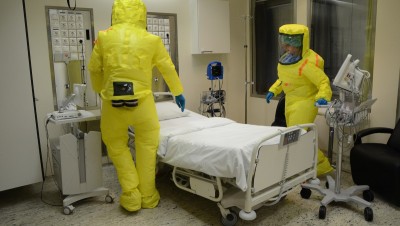UPDATED: An ebola-infected Norwegian doctor was carefully transported in a medical convoy with police escort from Oslo’s main airport at Gardermoen to the country’s largest hospital on Tuesday afternoon. Authorities clearly wanted no risk of traffic accidents as they kept other vehicles on the road well away from the specially equipped ambulance carrying the stricken woman.

Two reserve ambulances drove front and back in the convoy in the case of any trouble along the route. Another specially equipped air ambulance had flown the doctor from West Africa home to Norway, landing a few hours later than expected at the military portion of the airport.
The doctor became ill after helping to treat ebola patients in Sierra Leone. Her colleagues say that won’t stop them from continuing to fight the ebola epidemic.
“In order to extinguish this fire, we have to run into the burning house,” said Anne Cecilie Kaltenborn, secretary general of Leger Uten Grenser, the Norwegian chapter of the Nobel Peace Prize-winning humanitarian organization Medecins Sans Frontieres. Bjørn Fougner, a Norwegian nurse who also has volunteered with the Norwegian Red Cross to treat ebola patients, agreed. “It’s important to get the message across that people are needed to fight the ebola epidemic,” Fougner told newspaper Aftenposten. “I’ll gladly travel back (to West Africa).”
Fougner said he can understand why many people hesitate to volunteer their services, “but it’s not as scary as it can seem here at home.” He was among health care professionals who traveled to Kenema in Sierra Leone in August as part of a delegation from the Norwegian Red Cross.
Risks in removing protective suits
The Norwegian woman who tested positive for the potentially deadly virus over the weekend was working as a doctor in Sierra Leone for Leger Uten Grenser. An investigation is already underway into how she was infected with the virus herself.
One clear risk for health care workers occurs when changing out of the elaborate protective suits all must use when treating ebola patients. All undergo special training at a center in Brussels on how to suit up and carefully remove the protective suits, to avoid contamination.
“Our colleagues in Sierra Leone are doing all they can to find out how she was infected,” Kaltenborn told NRK. “We are examining whether a mistake was made, or whether our routines and procedures aren’t good enough, and we’ll take it from there.”
She noted that doctors and nurses can only work in their protective suits for around an hour at a time, because of the heat in West Africa. They therefore must change in and out of the suits several times a day “and that’s a critical moment, especially when the suit is taken off,” Kaltenborn said. Health care workers are often put on relatively short tours of duty in ebola-effected areas, as part of conscious efforts to prevent them from becoming less vigilant about safety routines.
Taking it ‘one hour at a time’
Kaltenborn said the woman was in relatively good spirits but also “sick and vulnerable.” Now the Norwegian national health care system was assuming responsibility for her, with teams of infection specialists ready at Oslo University Hospital Ullevål to start treatment.
Doctors at Ullevål said it would take one to two weeks to determine whether she’ll recover from the virus. “But we’ll take this one hour at a time,” Dr Dag Kvale, leader of the department for infectious diseases at Ullevål told news bureau NTB. Hospital staff has been training for months on how to care for ebola patients, should the need arise, and they’re also open to using some experimental drugs, NTB reported.
“Norway will use the latest available dose of ZMapp that’s been put forward by gene technology,” confirmed Steinar Madsen, medical director for the state pharmaceutical agency Legemiddelverket. The hospital has imported the experimental drugs TKM-ebola, ZMapp and Avignon to Norway, after approval from the agency. The drugs contributed to saving the lives of two infected health care workers in the US and have been used in West Africa.
Leger Uten Grenser has around 1,200 working for it in Sierra Leone, 86 of whom are international health care workers. Kaltenborn said there was “all reason” to boost staffing in West Africa and increase efforts to treat ebola patients and contain the spread of the disease. The epidemic poses a huge threat to the entire world, she claimed.
Norwegian government officials had just announced a doubling of funding to fight ebola before the case of the ill Norwegian doctor became publicly known. Health Minister Bent Høie stressed Norway’s commitment to help fight ebola and also tried to reassure the public, claiming that there was “very little risk” of ebola spreading in Norway. “That’s why we’ve planned for the evacuation and treatment of those infected,” he said. “And we have an obligation to help others in such a serious situation.”
newsinenglish.no/Nina Berglund

